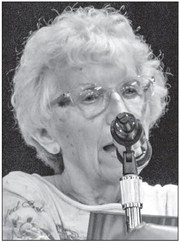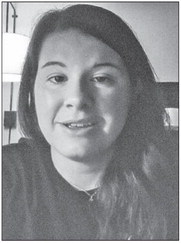Two new inductees selected for the Edgar Alumni Hall of Fame during Homecoming


Hall of Famers Brittni Werner and Ruth Hall appreciate their Edgar educations
The consensus among both 2023 Edgar Alumni Hall of Fame inductees at the Sept. 22 ceremony is they are successful in their adult lives because they received a strong education while attending Edgar schools.
Michael Wilhelm, Edgar middle/ high school principal, introduced the newest members of the Alumni Hall of Fame, Brittni Werner and Ruth (Syring) Hall, to the crowd in the school auditorium. Britti Werner appeared on live video while Hall attended the ceremony in person. Brittni’s parents, Randy and Marcia Werner of Edgar, accepted the Alumni Hall of Fame plaque on her behalf.
Brittni Werner
Brittni Werner grew up in Edgar and graduated from Edgar High School in 2007. She began her career in audio by participating in the Edgar school and community theater, arts and music programs. She graduated from UWGreen Bay in 2011 with a Bachelor of Arts degree in Technical and Design Theatre. She spent most of her time working on the sound, set building, lighting installations or as the stage manager for nearly all of the department’s seven annual shows.
While a college undergraduate, Werner also participated in summer internships as an audio technician with Maine State Music Theatre in Brunswick, Maine; worked as a non-union member of the Green Bay local IATSE 470 and at the Weidner Center for the Performing Arts.
After completing her undergraduate degree, Werner lived in New York City for a short time while working at The Times Center and for the New York Musical Theater Festival.
In 2012, Werner moved to Nashville, Tenn., to work in the music industry. She started mixing sound for the local clubs and “Honky Tonks” on Nashville’s Lower Broadway tourist district before being hired at Sound Image in 2013 and Clair Global in 2021.
Popular names like Tony Keith, Chris Young, Carrie Underwood, Imagine Dragons, Def Leppard and Kenny Chesney are on her resume, as well as the Nashville Symphony, accolades and features in trade publications’ Live Sound, FOH magazine and L’Acoustics. She also receives credits for televised productions of the annual CMA Fest and CMA Music Awards. Through her work, she has traveled to all 50 states and multiple countries.
Wener recently completed her Master’s degree in management to work on better personnel management strategies within the live entertainment industry. She holds a 200-hour yoga teacher training certificate. She enjoys hiking, gardening and reading in her free time when she is not working.
She appeared via video conference and thanked her Edgar High School teachers that made a difference in helping her achieve a career in the music industry.
“I wouldn’t be where I am today without the music, theater and arts programs at Edgar High School that I was exposed to,” Werner said. “I want to extend my thanks to the teachers who continue to plan trips and expand students’ world views into the arts.”
She also thanked her parents for allowing her to move to New York City to follow her dream. She had a last message for the Edgar students in the auditorium.
“Students, don’t be afraid to explore other options in careers because there’s more out there than ever before,” Werner said.
Ruth (Syring) Hall
Ruth Syring moved to Edgar when she was seven years old and she graduated from Edgar High School in 1952. She then married Wilfred (Willie) Hall in May of 1953 and they raised five children. In 1957, they built a house two blocks north of the Edgar school and Ruth Hall still resides there today.
Hall started volunteering and it became a life-long passion. Some of the many organizations she has volunteered for are the following: co-chairman of the Red Cross annual drive in Edgar; served eight years on the Marathon County Red Cross Board; played an instrumental role in starting monthly blood pressure screenings in Edgar; served on the 1998 Edgar Centennial Committee; served on the library passport committee; delivered Meals on Wheels; Cub Scout Den Mother; lector, CCD teacher and Eucharistic Minister at St. John’s Catholic; 40 plus years of volunteering at the voting polls, member of the Edgar Fine Arts Association and volunteer usher at the Grand Theater in Wausau.
Her other passion is sewing. She is a well-known seamstress, and this combined with her volunteering, has made and worn costumes for Stark’s Floral Christmas parade. She has also made clown suits and sewn on patches for the Edgar Fireman’s Celebration parade.
Hall has several pastimes that she enjoys when she is not volunteering. She loves to bowl and has been a member of a bowling league since 1962. Traveling has also been a large part of her life. She has visited all 50 states, Canada, Mexico and Europe. She also loves to read.
Family is the most important aspect of Hall’s life. She loves spending time with her five children, 11 grandchildren and nine great-grandchildren.
Hall accepted her Alumni Hall of Fame plaque from Wilhelm and then made her way to the podium, where she first congratulated Werner on her induction into the Edgar Alumni Hall of Fame. She had an important message for the students listening to her speak in the auditorium.
“I want you to know that everything I know, I learned at Edgar grade school and Edgar High School,” She said. “When I was in school, there were only eight rooms in this school. Two of the rooms were for the grade school and the other six rooms were for the high school. That was a long time ago and you guys have a whole lot more to choose from now. But just remember, Edgar roots run deep.”


